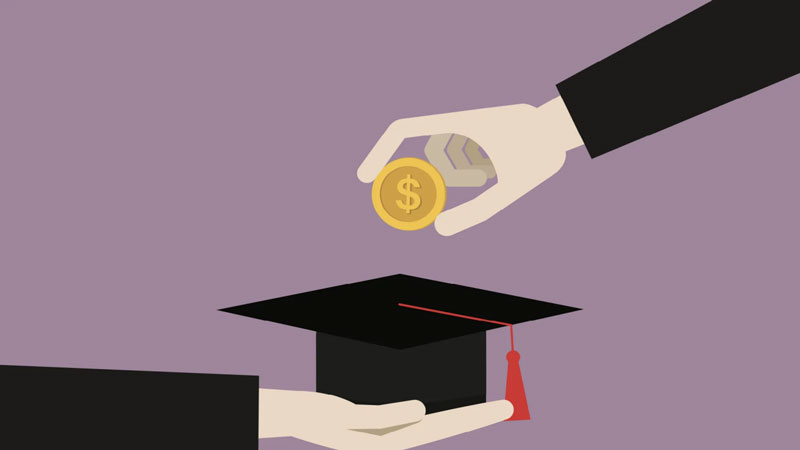If you just finished college or graduated, you might be startled to learn how much of each payment you make toward your student loan amortization goes toward the interest alone on your balance. To better grasp why this is the case, you must first get familiar with the process by which interest is accrued and how it is deducted from each payment.
Calculation of Student Loan Interest

If you want a better idea of what your financial plan should look like and what amount of money, you'll need to set aside each month for student loan payments by doing some simple calculations. To calculate the interest rate on your college loan, you will first need to locate your interest rate, figure out the total accrual cost, and then compute your monthly payment.
Steps to Calculate Your Student Loan Interest
Following are the steps to determining the cost of your student loan interests:
Having a set interest rate makes it easy to calculate the percentage of your monthly payment that goes against interest on your student loans. The interest rate on individual student loans is flexible, indicating it might go up or down throughout the loan. The interest you owe might increase over time as you accrue interest on the original loan balance and the accumulated interest that has yet to be repaid. In such circumstances, you might expect a higher overall interest rate on your student loans.
The following steps demonstrate how to compute the amount of interest that must be paid on a student loan with an average payback period and a set interest rate. If you have a Student Loan Interest, you could inquire with the mortgage provider about the most advantageous repayment choice available for your particular loan.
Calculate the Daily Interest Rate
First, to calculate your yearly payment on your student debt, divide the yearly rate of interest by 365 (that is the total number of days in a year). If you borrow $15,000 at an annual interest rate of 5%, the computation will look as follows:
0.05 / 365 = 0.00136 which is equivalent to around 0.013 % in daily interest.
Calculate the interest that Accrues Each Day
To calculate the total amount of interest due, add the principal credit of $10,000 to the daily interest rate calculated above. How much interest you earn each day depends on this.
0.00136 * $15,000 = $20.54 for each day
Calculate Every Months Payment
The final calculation is just the daily interest multiplied by the total no. of days in the billing period.
Allow us to presume that your billing cycle is every 30 days. You can figure out how much money you owe every month by doing the following:
$20.54 * 30 = $616.43 would be the total amount that is going to consume in interests
What is the Grace Period for Paying Off a Student Loan?
Regarding most student loans, the interest accumulates as soon as the funds are distributed for the loan. You typically won't be required to begin mortgage payments on your student loans till 6 months following your graduation or leaving your enrollment. However, any interest obtained before that point will be credited to the principal balance of your mortgage.
The only exception for Direct State supported Loans is a particular sort of governmental loan available only to students with exceptional financial needs. In such loans, the federal government pays the interest on these loans while the student is in school, throughout the timeframe, and during any deferral periods. So, legally speaking, interest won't begin accruing until you start making payments once the grace period ends.
Why Do Banks Capitalize on Interest?

One will have interest capitalization if the unpaid interest is applied to their student loan's principal debt. Interest continues to build up while they're students, even if they won't be responsible for making installments until after they graduate. When you capitalize on a loan, the principal sum is increased, and interest is accrued on the whole loan.
Interest will not accrue if payments are made on student loans before graduation. Even while it's not needed, it can end up saving you some cash when the time of your student loan payback arrives. Several of those lenders will lower your interest rate if you decide to make interest-only contributions on a private loan while in school.
Should I Combine My Debt to Save Money?
It's conditional. Consolidating your debts might make your life easier. Still, you must proceed cautiously to avoid giving up any advantages you may already be receiving due to the mortgages you are now holding. The first thing you need to do is determine whether or not you are qualified to combine your debts or not. Then you shouldn't be registering in school with a part-time status or anything less than that. You must actively pay off your loan installments within your grace period to be eligible. You cannot be a defaulter and must possess a minimum of $6,000 to $7,000 in debts to qualify for this program.
Can I Deduct the Interest on My Student Loans?
Yes. Deductions of up to $2,500 are available to those eligible to their predefined criteria, which include their filing status, income, and the amount of interest they pay.
Conclusion
If you have a conventional payment schedule and constant Student Loan Interest, you can quickly determine the amount of interest you owe. You may always consult with your mortgage provider to find out how alternative repayment options will affect or reduce your expenses if you are interested in reducing your overall interest payments throughout the term of the loan.



